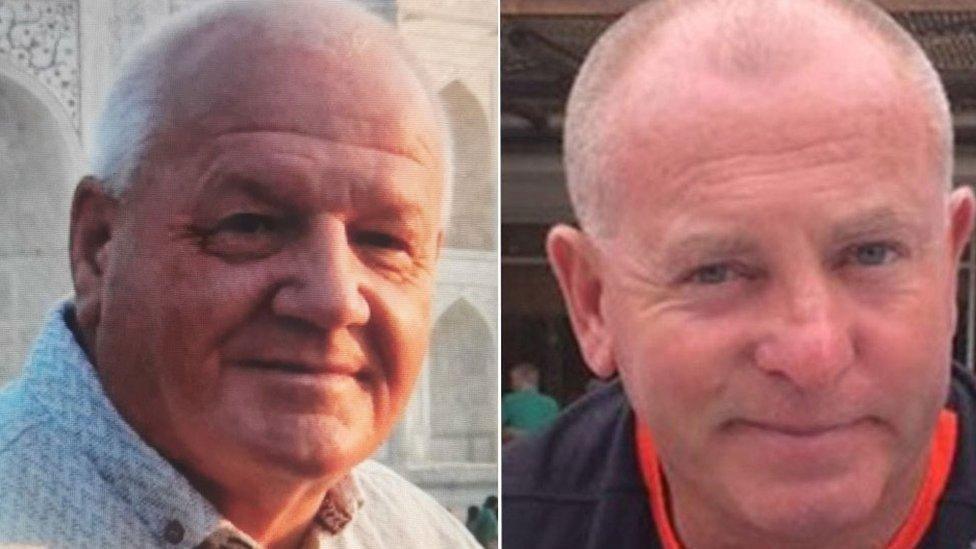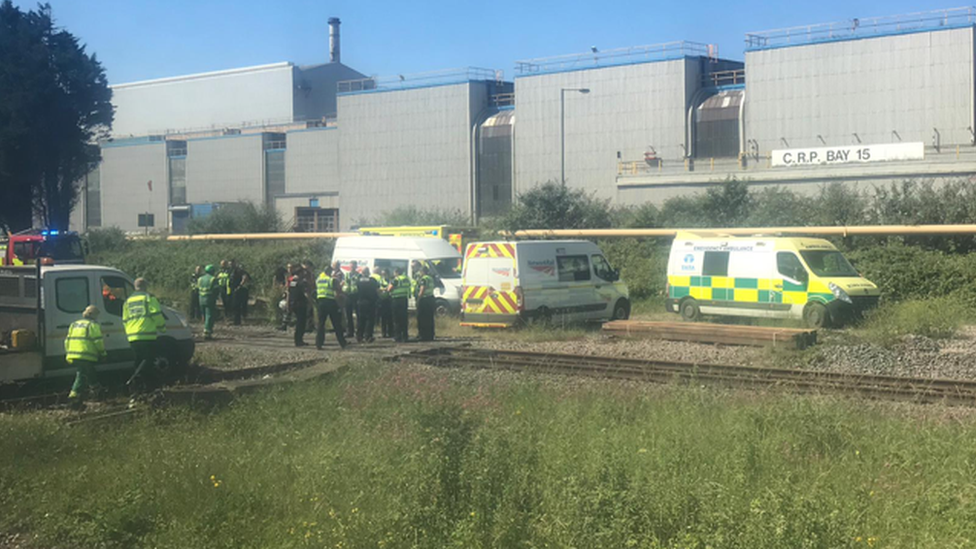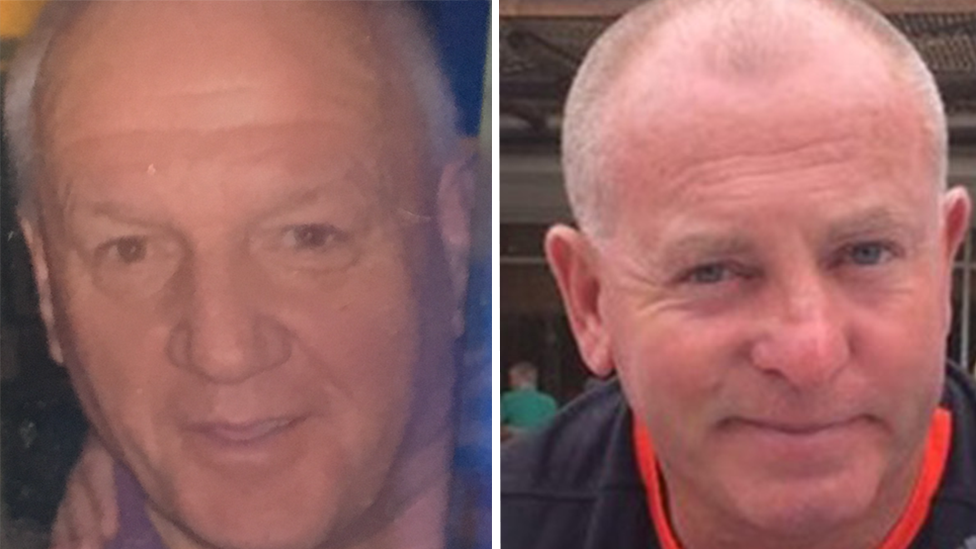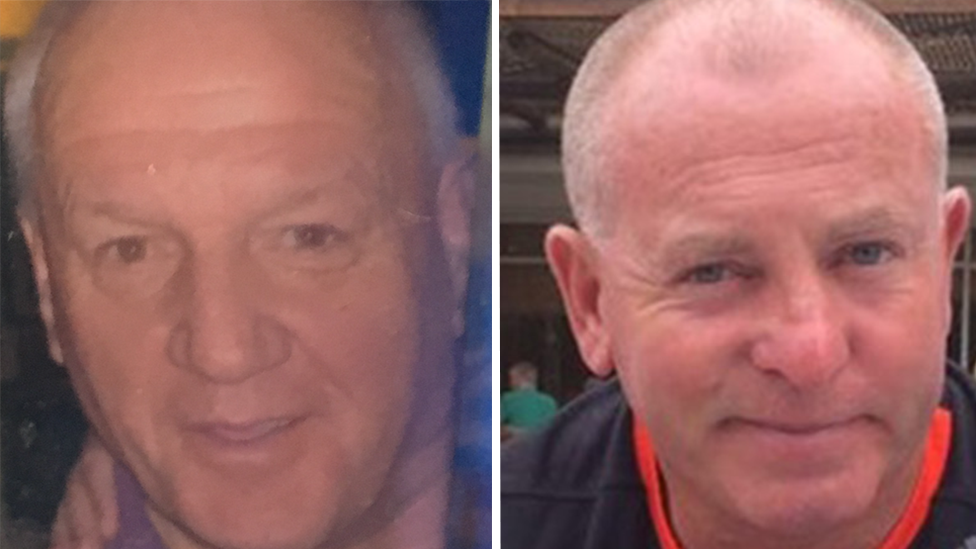Family tributes as rail firm fined £4m for deaths

Gareth Delbridge and Michael Lewis died when they were struck by a train while working in July 2019
- Published
The families of two workers who were struck and killed by a train following safety failures have spoken of the "irreplaceable void" in their lives as Network Rail is fined nearly £4m.
Gareth Delbridge, 64, and Michael "Spike" Lewis, 58, were hit by a Great Western Railway train travelling from Swansea to London Paddington in July 2019.
The two men had been working for Network Rail at Margam, near Port Talbot, at the time and a third track worker also came close to being hit, with a previous report describing him as "severely traumatised".
Network Rail said it continued to "transform the safety of our workforce" following "the tragic deaths".
At Swansea Crown Court on Friday, Recorder Christian Jowett fined Network Rail £3.75m, saying the company had failed to put in place proper measures to protect the workers.
The judge said issues surrounding safety policy had been known for some time and the firm had failed to make improvements.
Network Rail previously admitted its role in the men's deaths.
The families of the two men said no legal outcome could fill the "irreplaceable void" in their lives.
But, they added, they remain "committed to raising awareness" of the need for stronger safety measures after this "heart-breaking reminder" of the risks faced by railway workers every day.
'Long-term safety failure' a factor in rail deaths
- Published12 November 2020
Rail worker deaths prompt £70m safety task force
- Published11 July 2019
'No formal lookout' at rail worker deaths site
- Published5 December 2019
The court heard that, in the absence of technological solutions, the only protection workers had was a lookout, which Mr Jowett described as the "lowest level of protection".
"Visibility towards Port Talbot at the site was restricted due to a curve in the track, so the need for two lookouts was identified, with four men carrying out the work," he said.
"But what happened was the group split into two, one to carry out the maintenance work and the other to carry out [other] work - no one was available to be the second distant lookout.
"The task was noisy because of the type of machine being used."
The judge said none of the workers were aware of the approaching train "until it was too late".
Issues surrounding Network Rail's track safety policy had been known since 2017, but the judge said by 2019 the steps taken had "not resolved the concerns".
Mr Jowett said the policy - called Standard 19 - for how track work should be carried out was "substantially based on a number of unsuccessful initiatives since 2014", following previous deaths in 2011 and 2012.
"I find that Network Rail therefore must have had a good understanding of why these initiatives failed," he said.
"However, I also find that it didn't learn from these experiences because the design and rollout of Standard 19 repeated a number of mistakes and introduced further mistakes."

The men were hit by a morning service travelling from Swansea to London Paddington
Contrary to its own policy, Network Rail did not consider it necessary for the rollout of Standard 19 to be delivered by qualified trainers, with the amount of training reduced from eight hours to two and a half, with a video, "which may have added further confusion".
The judge also said track workers had narrowly avoided being struck by trains in July 2018 and April 2019, and in December 2018 the regulator indicated that it was "minded to serve improvement notices".
Nick Millington, route director at Network Rail Wales and Borders, said the "tragic" deaths of Mr Delbridge and Mr Lewis "should never have happened on our railway".
"Since this tragedy, we have continued to transform the safety of our workforce through the development of new technology and planning tools, which have almost entirely eliminated the need to work on the railway when trains are running," he said.
"Today's judgement reinforces why safety must always be our first consideration, and we will continue to do all we can to make our railways the safest they can be."
Mark Phillips, chief executive of the independent organisation Rail Safety and Standards Board, said the incident was a "catalyst to completely rethink track worker safety".
The families said their "immeasurable" loss continued to be felt deeply every day.
"Gareth and Mike were not just workers; they were devoted family members, cherished friends, and valued members of their community," they said in a statement.
"What makes this tragedy even more devastating is that their deaths were preventable.
"The failure of both their employer and the regulator to implement and enforce proper safety protocols cost them their lives."
They added: "While we acknowledge the progress made in safety since Gareth and Mike's deaths, we remain steadfast in our commitment to ensuring their deaths lead to lasting improvements in railway safety.
"Their legacy must be one of change."
Related topics
- Published5 July 2019

- Published4 July 2019

- Published1 October 2019
